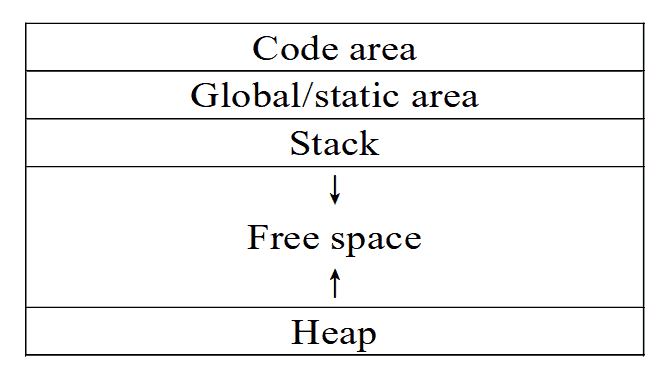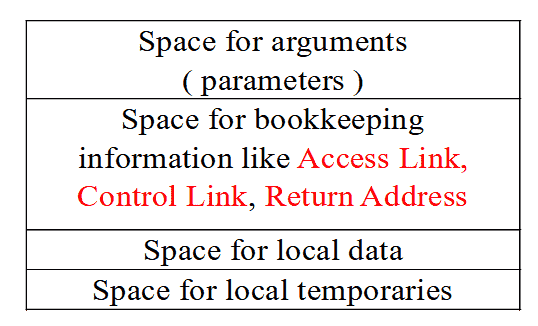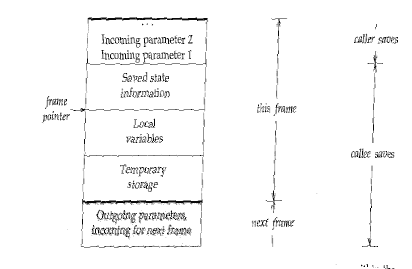06 Procedures
Named block of code. When the name is called, the body is executed.
Types of Procedures¶
| Function Procedures | Proper Procedures | |
|---|---|---|
| Extend built-in __ of language | Operators | Actions/statements |
| Return | single value | - |
| Set variables/perform output | ||
| Placement | Within-Expression | Atomic Statements |
r * sin(angle) | read(ch) | |
| Called by function | ✅ | ❌ |
| Called by procedure | ✅ | ✅ |
| PL | C/C++ | Pascal |
Procedure Definition¶
- Procedure Name
- Code body
- Formal Parameters
- Return type
Note¶
C does not allows procedure bodies to be nested, so uses control links only. So calling a procedure means that procedure will be
- Within same procedure (or)
- Outside all procedures
Procedure Calls¶
Procedure Activation¶
Execution of procedure body
Layout of activation is known at run-time
Frame is put on the stack and storage within is accessed relative to the frame pointer.
The values of variables in an activation are accessed as
- Frame Pointer + Displacement (or offset)
- Displacement is calculated at run-time
Benefits of Procedures¶
- Procedure Abstraction
- Hides implementation details
- Program Legibility
- Better maintainence
- Better modularity
- Code re-usability (user-defined and from libraries)
Parameter Passing Methods¶
| Call by value | Call by reference | |
|---|---|---|
| Passed | Absolute value Variable | Address Pointer |
| Changes to formal parameter in the function affects the actual parameter? | ❌ | ✅ |
| Same memory location for Formal and actual parameter | ❌ | ✅ |
| Default in PL | C | Pascal |
Scope¶
Scope of Variable¶
Part of program where use of variable refers to its declaration
| Static/Lexical | Dynamic | |
|---|---|---|
| Binding occurs during | Compilation | Execution |
| Programmer Comprehensibility | Easy | Difficult |
| Example | C Pascal Java Pearl ( my) | Python LISP Pearl ( local) |
| Rules | A variable always refers to its top-level environment | |
| Variable declared within a block are not in the scope outside the block | Global identifier refers to the identifier associated with the most recent environment | |
| Variables outside the block are visible unless overridden | The occurrence of a identifier is searched in the most recent binding | |
| Binding of variable can be determined by program text, independent of run-time function call stack | Each time a new function is executed, a new scope is pushed onto the stack. | |
| Compiler first searches in the current block, then in global variables | The compiler first searches the current block and then successively all the calling functions. | |
| ### Scope Rules |
Visibility rules for names in a PL; names could denote procedures, types, constants, variables
Macros¶
- Procedure body is substituted at every point of call
- Actual parameters are substituted for the formals Different from call by value/reference
Dynamic scoping
Every occurance of pi is replace with \(3.14\) by the compiler.
Every call of product(x, y) is replaced with x*y
Runtime Memory Model¶
Layout of executable file
| Segment | Stores | |
|---|---|---|
| Code | Machine code of program | |
| Static | Data live throughout program execution - Global vars - Constants | |
| Stack | Local variables of procedure Procedure activation records (C, Pascal) | Space reclaimed when procedure terminates Relative Address of variable are same |
| Heap | Dynamic memory allocation Procedure activation records | Activation records stay here as long as they are needed |

Procedure Activations¶
I didn't understand this

Activation Record¶
Activation records on stack are called as stack frame
Sections¶


| Link | Type | Represents ___ environment of procedure | |
|---|---|---|---|
| Access | Static | Points to activation record for run-time caller | defining |
| Control | Dynamic | implement statically-scope languages | calling |
Special Registers¶
| Register | Full-Form | Pointer to |
|---|---|---|
| PC | Program Counter | Next instruction to be executed |
| SP | Stack Pointer | Last location allocated on call stack |
| FP | Frame Pointer | Current activation record to allow access to local variable |
| AP | Argument Pointer | Current argument/parameter |
Variables¶
Storage is allocated at compile time
Languages without recursive procedure treat all variables as static.
| Static | Local | |
|---|---|---|
| Lifetime | Entire program | Within procedure activation |
| Retain values between activations? | ✅ | ❌ (Bound to distinct storage in each activation) |
Example for Static variable declaration in C
Activation Tree¶
Tree representing procedure activations of program
For eg: Trees for merge sort, quicksort in DSA
Garbage Collection¶
Technique to reclaim storage that is no longer needed
Recursion¶
Also called as multiple activation
Recursive procedure is one that can be activated by its own body.
| Traditional Recursion | Tailed Recursion | |
|---|---|---|
| Nothing to do after the function returns, except return its value | ||
| Compiler replaces caller with callee | ||
| Last statement in the body of procedure is recursive call | ❌ | ✅ |
| Steps | - Perform recursive calls first - Take the return value of the recursive call - Calculate the result | - Perform your calculations first - Execute the recursive call - Passing results of current step to next |
| Result of calculation obtained | only after returning from every recursive call | |
| Re-use Stack Frame | ❌ (Nested Stack Frames) | ✅ |
| Efficient | ❌ | ✅ |
// Traditional
factorial(n) {
if (n == 0)
return 1;
return n * factorial(n - 1);
}
// Tailed
factorial1(n, accumulator)
{
if (n == 0)
return accumulator;
return factorial1(n - 1, n * accumulator);
}
factorial(n)
{
return factorial1(n, 1);
}
Converting a tailed-recursion logic into an equivalent control-flow logic is called as Tail-recursion elimination. This can be done using goto